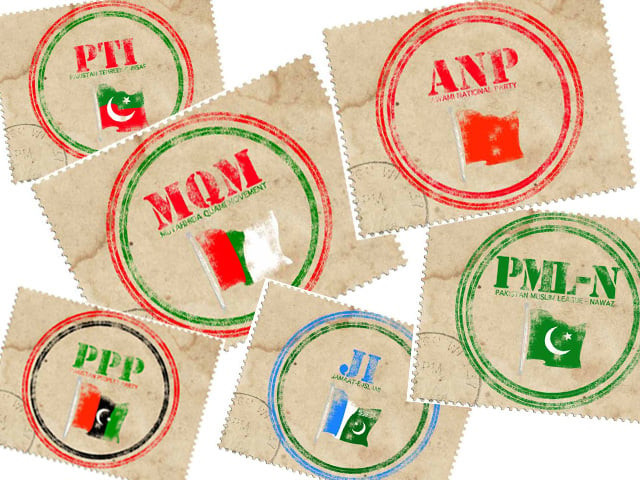Policy. What policy?: Leaders’ ‘acumen’ trumps research for political parties
Lack of think tanks leads to creation of personality cults, experts say.

You know all’s not well when the foreign affairs spokesperson for an up-and-coming political party is rabidly anti-all-things-foreign. The problem is not an isolated one though. Political parties in Pakistan, unlike their counterparts in stable democracies elsewhere, lack well-defined, structured think tanks or research wings to guide their policies, especially those related to foreign affairs and the economy.
This deficiency leads to creation of ‘dictatorships or personality cults’ within these parties, say representatives of mainstream parties.
The big two are worst off
While smaller, relatively new parties claim to have established research cells, the problem with the country’s two largest parties is acute. The ruling Pakistan Peoples Party (PPP) has been relying on what its critics call ‘imported’ individuals for leading its economic team.
After the resignation of Pakistan Muslim League-Nawaz’s (PML-N) Senator Ishaq Dar as finance minister in 2008, the PPP government first brought a banker and then an economist to replace him. Neither the former finance minister Shaukat Tarin nor the incumbent Dr Abdul Hafeez Sheikh were associated with the PPP until they were given the key portfolio.
The party’s information secretary Qamar Zaman Kaira, however, said: “We have special committees dealing with and advising the central leadership on various issues.” He admitted, though, that hardly any note-worthy academics were affiliated with these committees.
Meanwhile, the opposition PML-N established a think tank some time back, but some party leaders say its recommendations could hardly stand in front of the party chief’s ‘acumen’ on all issues. Party’s deputy information secretary, MNA Khurram Dastgir Khan, says otherwise: “We do seek advice from our think tank on all issues and due importance is given to its suggestions.”
Well-intentioned, ill-prepared
The Muttahida Qaumi Movement (MQM) has an eight-member Research Advisory Committee but one of its top leaders admitted the forum has never been as active as it should be.
“We are in the process of establishing a national advisory body with experts of all fields from across the country,” said Wasay Jalil, an MQM leader.
Pakistan Muslim League-Quaid’s Tariq Azim also ‘confessed’ that neither his, nor other political parties in the country, had any research and analysis wings. “Ideally, the opposition should have a shadow government for preparing to meet emerging challenges … but that is not the case,” Azim said.
The right-wing and emerging parties, however, claimed they were prepared.
JUI-F’s Mufti Kafayatullah said a powerful group in the party specifically worked on issues related to domestic politics, economy and international relations. Meanwhile, Jamaat-e-Islami’s Liaquat Baloch said his party had separate groups of experts on various spheres, and their reports were taken up by the group’s central working committee twice a year.
A PTI spokesperson also claimed the party had more than 15 expert groups on different sectors which prepared policy papers.
Published in The Express Tribune, November 12th, 2011.



















COMMENTS
Comments are moderated and generally will be posted if they are on-topic and not abusive.
For more information, please see our Comments FAQ